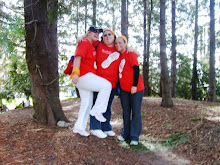This is MY journey with MS! I give you my thoughts, feelings, hopes, and prayers. My wish that one day this disease will come to an end. That one day there will be a cure. For now, I hold on to possibility. I HOPE this will help and inspire not only myself but others.
Girls Night Out - Seattle, WA
What a great experience! Oh and the view....it all started here, at Salty's <<--at Alki in Seattle. The event was held in the lower part of the building (so right on the water). The room had large windows on two sides and the way the room was set up, the tables faced us so that we had this perfect view across the harbor to the Seattle skyline. The event started at 5:30, although due to Seattle rush hour traffic people trickled in until about 6-6:15. It was daytime when the event started and as the event went on the view in the backgroud was great as the sun set. Spectacular! It was catered with some wonderful food. Of course, being in Seattle we had a variety of seafood. Salmon and crabcakes. There was also pasta, asapargus, fruit, breads, and more. Each table was nicely decorated and each guest was given a welcome gift (samples of Mary-Kay make-up) and a corsage.
There were 4 of the top female MS Specialists there to talk to us about topics relating to women and MS. Of course, this information can be just as helpful for men and people who don't have MS, but maybe have a loved one with MS or someone who just wants to learn more.
The first speaker was Dr. Lily Jung from the Swedish Neuroscience Institute. She talked to us about Disease Patterns. Did you know that the risk of MS in the US is 1 in 750? That is pretty high in contrast to some other illnesses. It also turns out that your risk is based on where you live and how long you have lived in that place. For example, the risk would be almost the same for someone who was born in China but moved to Washington State and remained there as someone who was born in Washington State. Now, obviously there are other factors that go into this, but in regards to the environmental risk, the risk for each of these people will be very similar. Whereas there is very little risk to this person had they continued to live in China until they were 15 (which happens to be the cut off age for exposure to MS in regards to where you live). Also there is a higher risk above latitude 40`.
There are many factors that determine your overall risk of developing MS and there is still so much information that we do not know, but new information is being learned all the time. People who are from a Northern European ancestry have the highest prevalence of MS. Another thing I thought was interesting was the risk factor in regards to families. If you have a mother with MS you have a 1 in 40 risk, this is high but not significant. Twins, now that is an interesting subject. Fraternal twins have a 1 in 12 risk and identical twins have a 1 in 4 risk. And, although our risk is a bit higher if we have a family member with MS, this does not mean we should go out and start doing genetic testing. According to Dr. Jung this is not necessary. There are so many factors that go into it that it would not be appropriate to do this. I loved how she summed it up. She said..."You can't control what happened to you in the first 15 years of your life, that is in the past. You can't control your genes. You CAN control how you deal with your illness! Go to the doctor, take disease modifying medications, take vitamins, get some sleep, eat a healthy diet, and exercise. These are the things you CAN do!" 
Dr. Mariko Kita was the next speaker. She works at the Virgina Mason MS Center in Seattle. She talked a lot about hormones and how they factor into this illness. As many people already know gender plays a big role in the subtype. MS is rare before puberty, therefore it is believed that hormones play a big role in MS, along with some other autoimmune illnesses. A couple things I found very interesting (although neither of them apply to me, seeing how I do not take birth control and cannot have more children, post-hysterectomy) were that a study that was done retrospectively showed there was a 40% lower risk of developing MS or prolonging the symptoms of MS if a person was taking oral contraception. Now, there is no current data to show if the pill will help after developing MS but if you are currently taking the pill just think it may help :) Also *very interesting* there have been studies showing that during pregnancy the body has a 70% better response to MS than any drug currently on the market. What makes this so interesting is that when a woman is pregnant our body’s immune system is lowered because essentially it is giving everything to the child. Now, this is not an advertisement to go out and have a bunch of babies, but I think this is very interesting area that research should be focusing on. There are also a few studies looking into how MS reacts with the menopausal phase (this is where I will benefit, yes I am only 29, but I went through menopause at 25). They are looking at hormone replacement therapy (HRT), estriol, and also at testosterone (benefits for both men and women). For the first time this is becoming more of an issue as the illness is becoming more known, treatments are more available, and the general population is growing older. For the men out there: Did you know that your testosterone starts to fall by 1-2% each year at the age of 30. This is about the time that men start to develop MS symptoms, which leads researchers to believe there is a link between MS and men's hormones. Currently there are some studies being done, hopefully more will come. I also found out that the prognosis for women is typically a bit better than men. There are a higher number of women with MS, but there are more men with PPMS. This may have something to do with the fact that they are typically a little older when they first start to develop symptoms.
Next we have  Dr. Jodie Haselkorn from the VA Hospital MS Center in Seattle. She had a bit of a different perspective because although she does work with women, she mainly works with men. She talked to us alot about meditation and adding balance into our lives. She stated that the best thing we can do for our bodies is to "DRINK WATER". She also says it is important to develop an acceptance of ourselves, love ourselves. Once we learn to do that then we can move on to someone else. She says that goal with meditation is to be free from any harmful thoughts or feelings, any extra stressors. Give up the things that would waste our time, our health, our mind, and our life. One of the guests at the dinner asked her if sitting at her computer each night playing solitaire and just winding down from the day was a form of meditation. Dr. Haselkorn's response was that it would not be her choice because that is not something she personally would enjoy, however whatever relaxes you, gives you some peace, some quiet and allows you to release some stress. That is a start. She warns though that whatever you do try and do something to release your mind without becoming so relaxed you fall asleep (unless that would be your goal!) I say if you are tired and fall asleep after being completely relaxed than great! But, then again, I am not the doctor. :)
Dr. Jodie Haselkorn from the VA Hospital MS Center in Seattle. She had a bit of a different perspective because although she does work with women, she mainly works with men. She talked to us alot about meditation and adding balance into our lives. She stated that the best thing we can do for our bodies is to "DRINK WATER". She also says it is important to develop an acceptance of ourselves, love ourselves. Once we learn to do that then we can move on to someone else. She says that goal with meditation is to be free from any harmful thoughts or feelings, any extra stressors. Give up the things that would waste our time, our health, our mind, and our life. One of the guests at the dinner asked her if sitting at her computer each night playing solitaire and just winding down from the day was a form of meditation. Dr. Haselkorn's response was that it would not be her choice because that is not something she personally would enjoy, however whatever relaxes you, gives you some peace, some quiet and allows you to release some stress. That is a start. She warns though that whatever you do try and do something to release your mind without becoming so relaxed you fall asleep (unless that would be your goal!) I say if you are tired and fall asleep after being completely relaxed than great! But, then again, I am not the doctor. :)
Our last speaker of the evening was Dr. Sylvia Lucus from the University Of Washington Medical Center. She talked to us quite a bit about MS and Intimacy. This is a very important topic because relationships are often impacted when someone is diagnosed with an illness such as this. There are the obvious reasons for why there could be problems with intimacy or just relationships in general when dealing with MS. There are so many unknowns and so from day to day not only do you not know what to expect but your loved ones don't either. She talked a lot about the importance of communication. Let me say it again, COMMUNICATION! I am always telling people how important this is because I had this problem with my ex-husband when I got sick before. We did not communicate well and it was an issue with us. Maybe if we could have talked about how each of us were feeling, things would have been different. It is interesting to think we are best friends now! It is difficult to talk about what is going on, but we can't expect them to just know how we are feeling or what our needs are if we don't tell them. At the same time they must be willing to open up and talk to us. Those are the times we need to learn to just listen.
As the illness progresses there are other issues that may arise. Did you know that there can actually be a physiological problem in conjunction with the MS which can prevent a woman from having an orgasm? Not all people with MS will have this problem, I am not sure if it can happen to men or not (but I suspect this is similar to what erectile dysfunction is all about). There is a nerve that runs up to your brain and if it is not working right, no amount of sex will help (at least not in the normal way). They actually did a study and it turns out there are other ways to help. She recommends that if you are having problems and want to be intimate, to talk to you doctor. There is nothing to be ashamed of. The reasons in which a person with MS has issues with intimacy can range from anything from not feeling comfortable due to the consciousness of the illness, depression, being on an anti-depressant, or an actual nerve problem. If it turns out to be a nerve problem she said with therapy and the willingness of you and your spouse to be okay with alternative ways of being intimate, you can achieve the intimacy you wanted all along.
Once the doctors were done speaking the guests had a chance to ask questions and here is what they wanted to know. Q: Will the desire for sex return if I come off anti-depressants? A: Yes. Anti-depressants can decrease your mood, but the side effects should go away when you discontinue the medication. Q: How do we get the government and researchers to do studies on things like HRT or other menopausal hormones? A: Be an advocate! Make some noise! The more noise is made, the more information we get out, and the more we are heard the better chance we have to make a change. Q: What causes Foot Drop? A: There are many things. Spasticity, spasms, and lack of nerve functions.
The end of the night there were a few raffle drawings, of which I won one! I won a pair of handmade earrings and an Aveda care bag. Overall I am very glad that I went. It was enjoyable and informative. I hope you all can find this information to be of benefit to you. If you have any questions or want more information, leave me a comment or send me an email. Take care!
All personal text & images are protected under copyright law. 2006-2009
About Me

- Jaime
- I was diagnosed with MS in 2004, have been through all of the FDA approved treatments I qualify for and now am participating in the HALT MS Study. This is my story...my life with MS (among other things).
MS Advocacy
MS Bloggers
MS Donations
MS Links
- Accelerated Cure Project for MS
- Allison Shaddy: MS & Your Feelings!
- Consortium of MS Centers
- Cure MS Now Research Fund
- Face of MS
- Heuga Center
- International MS Support Foundation
- Maureen Manley: Spirit in Motion
- Montel Williams MS Foundation
- MS Active Source
- MS Association of America
- MS Complementary & Alternative Medicine
- MS Foundation
- MS International Federation
- MSplus Foundation
- MS Watch
- National MS Society
- Race to Erase MS
- Rocky Mountain MS Center
- Top 10 Sources (I'm #3)





















2 comments:
Impressive Cast!
Thanks! I took a lot of notes and wanted to share the information with all of you. :) I felt it was great information that could be of benefit to all of us. I hope you are well. Please take care of yourself. Jaime
Post a Comment